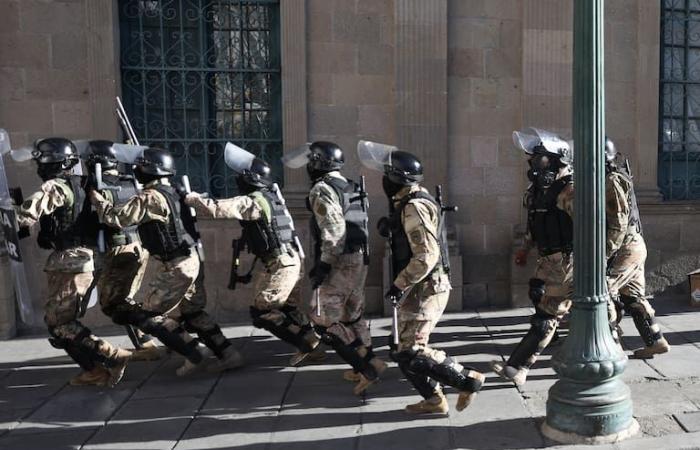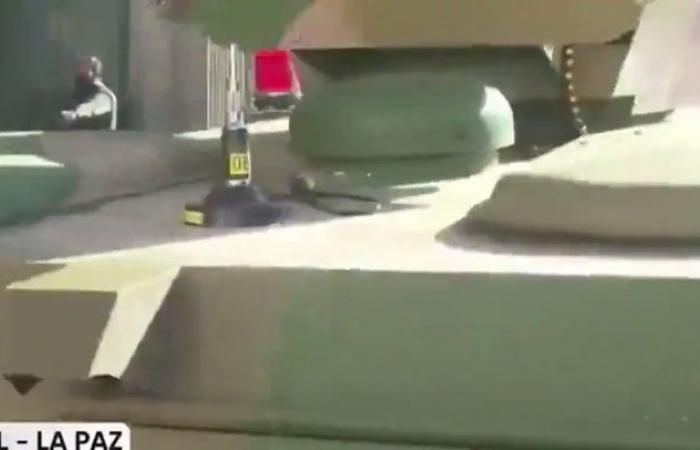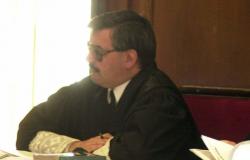Hear
Bolivia is experiencing a day of high tension, after a military uprising that the government describes as an attempted coup d’état. This is what is known:
With infantry troops and armored cars, Army units They mobilized surprisingly in Plaza Murillo, the heart of La Paz, and they entered the Quemado Palace, presidential headquarters, with a tank at 3 in the afternoon, local time. Immediately, President Luis Arce denounced the “irregular mobilization” of the troops, while former President Evo Morales – former ally, political father and today sworn enemy of the current president – warned that a coup d’état was brewing. Both called on Bolivians to mobilize to return calm to the streets of the country.
The tension grew with the minutes as Plaza Murillo filled with military personnel. And it reached its greatest point when the recently dismissed head of the Army, Juan José Zúñiga, confronted Arce directly, face to face. “Follow my order, Captain, and return to the barracks immediately,” the president told him, to which Zúñiga refused. His troops remained in the plaza for a few hours, during which fear began to take over the Bolivians, but as the sun set, they began to retreat.
The visible face of the military uprising is the now former head of the Army, Juan José Zúñiga, that last Monday he had threatened to arrest Evo Morales if he ran for president again, in 2025. The former president governed Bolivia for three terms and a constitutional court prohibited him from running for another; He argues that this disqualification violates his human rights. Zúñiga’s statements created a gigantic stir in the country, and the Government described him as a “removalist” and removed him.
Zúñiga’s stated objective is “reestablish democracy” and release the “political prisoners,” as he said a few minutes ago.
“The request of the military units is that we soon release all political prisoners, from [Luis Fernando] Camacho until [Jeanine] Áñez, the generals, captains, that is the order. We want to restore democracy. The army does not lack guts to ensure the well-being and progress of our people. Enough of some taking over this country. All units in the country are garrisoned,” he said.
Áñez assumed the presidency in November 2019, when Evo was displaced in the middle of an uprising by the armed forcesaccused of having committed fraud in the presidential elections. A little over a year later, after Arce’s victory in the elections, Áñez was arrested and, in 2022, was sentenced to ten years in prison for “crimes against the Constitution” and “breach of duty.” Camacho, for his part, was the head of the opposition and governor of Santa Cruz de la Sierra, Bolivia’s economic capital, and was arrested at the end of 2022 also for the 2019 uprising.
For now, Zúñiga refuses to give in despite insistent calls not only Arce and his officials but also the rest of the Bolivian political forces, including former president Áñez, who demanded total respect for democracy, from prison.
Other opposition leaders, today as divided as the ruling party, joined that demand. And, for its part, the powerful Bolivian Workers’ Central called for an indefinite strike in support of the President and the constitutional order.
The certainty that an uprising was underway also led the OAS and presidents of most countries in the region to urgently call for calm. One after another, government condemnations followed, from Chile and the United States to Brazil and Argentina.
Given the internal and external isolation of the rebel troops, the key question at this time is how many more units or which branches of the armed forces support Züñiga. The progress of the uprising will depend on that eventual support. After the uprising began, Arce appointed a new military leadership to guarantee the loyalty of the forces with the memory of 2019 in mind. In that uprising, the Armed Forces, then loyal to Evo, did not take long to turn their support around and demand that the then president resign; That precipitated Morales’ departure.
In the event that Zúñiga’s coup attempt is nothing more than a short and solitary adventure, Arce will surely experience a period of popularity and unprecedented transversal support from all Bolivian sectors. But if he believes that this support is for him and not for democracy, if he does not manage to respond to that endorsement with a conciliatory speech – until now absent – Bolivia will once again fall into the cracks that today left it on the verge of another institutional breakdown.
Short or long the coup adventure, the armed forces, for their part, will inevitably sink into discredit and the weakness into which they have fallen incessantly since 2019.
The Bolivia that is today the scene of an attempted coup d’état It is crossed by more and more fractures and burdened by economic decline which today does not seem to have much of a solution. The uprising of the Army is just one of the breaks that weaken the country.
In politics, the most visible of the fissures is the one between Arce and Morales, who are at odds today very much in the style of Alberto Fernández and Cristina Kirchner or Rafael Correa and Lenin Moreno, in Ecuador. Hit by this division, the MAS – which propelled Evo to power – cannot stand as a government party and has even lost the unwavering loyalty of the most vulnerable sectors of the country. For its part, in addition to being fragmented, the opposition is a frequent target of judicial persecution encouraged by the ruling party.
Just as the coup units are isolated at this moment, Bolivia’s main political protagonists fail to receive the cohesive support of Bolivians. There are too many cracks.
The economy cannot stand up either. Their main source of income, the sale of gas, is collapsing; Its main clients – Argentina and Brazil – today buy a third of what they bought a few years ago. That source of foreign currency sustained Bolivia’s incredible economic progress between 2005 and 2015, but today, with the flow decimated, public finances are sinking into a furious red, prices are rising and the economy is stagnating.
Bolivian politics and economy are almost bankrupt. The attempted coup d’état can either finish breaking them or be the beginning of the recomposition.







